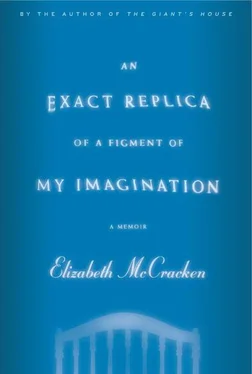Then she turned to me and said, It’s Claudelle. You must talk to her.
I was in patient mode and nodded, though I was starting to realize something. I was done with Claudelle. Time on this planet actually ran in only one direction. No matter what, I could not travel backwards to a living baby and an ordinary birth, and I did not want to turn my head a fraction in the direction of the past. Not a second, not for anything. I was done with Claudelle, I was done with the Bordelaise roads I’d driven from the first hospital to this one. I did not want to retrace a thing.
This was a conversion moment for me. Twelve hours before, I’d barely believed in the future. I know that sounds crazy, especially for a pregnant woman. Don’t get me wrong, I knew it existed. At the same time, the flat-earth part of my personality wanted to ask, Where’s the proof? Of course the future kept arriving, of course it did, it arrived second by second, an assembly line of itself. But what I really believed in was the past, which is proven everywhere, and accessible: I’m a librarian, and I could show you where to look. The past is located in microfilm and bound volumes of magazines, in movies, memoirs, ephemera, granite, fluoroscopes in shoe stores; the career of Mamie Van Doren; the never mentioned first marriage and subsequent divorce of my cousin Elizabeth; speeding tickets; the daughters of Akhenaton; the invention of Silly Putty; trilobites. But the future? Let it come, let it age, let it be recorded, I’ll get around to the future eventually.
That’s what I thought until Pudding died, and then, at least for a while, I was like a sinner trembling on the edge of faith, demanding of the future: come, prove yourself, and I will renounce the past and everything I believe in.
In the exam room I did not yet have the courage of my convictions. I took the phone from Sylvie.
“Elizabeth, I am so sorry,” Claudelle said. “Oh. I am so sorry. Please know my heart is with you.”
“Yes,” I said. “OK. Thank you.”
Later I would wonder why Sylvie had made me talk to her. She did it with a kind of medical authority, and I dumbly accepted, thinking that she knew what I needed.
I don’t think it did me a bit of good.
Edward and I clung to each other in the hallway of the Tripod Hospital, waiting for someone to take us to a room upstairs on the ward. The staff would see if they could find a cot for Edward. Otherwise he’d go to a hotel. A midwife passed by, a woman in her early fifties with short hair and a slightly daffy demeanor. She said, in French, Why do you look so sad? You’re going to have a baby!
“Le bébé est décédé,” Edward answered.
There’s a certain French — gesture? moue? — that is ubiquitous and hard to translate. In answer to a question or piece of information, the French person fills his or her mouth with air and then puffs it out, eyebrows raised. It means, It is difficult to say, and it can be the answer to, How do you drive to Lyon? or Do you have this in my size? or, it turns out, The baby is dead .
Of course it all felt like an emergency to us, something to be taken care of immediately. Who would make a woman spend one more moment on this earth than is necessary with a dead child in her body? I thought I’d be induced instantly, I would deliver instantly, and then we could talk about leaving.
No. They would give me some medication to soften my cervix. The next day nothing would happen other than some blood tests to see if they could find an explanation. It’s very important, the doctor on the ward explained. The day after that, they would induce, and le travail would commence when it commenced. We could only hope for the best.
The hospital room was no more picturesque for being French. They had found a folding cot for Edward, a miserable mid-1980s-ish polyester-sheeted appliance that meant he could sleep next to me, though at a considerable drop from the high hospital bed. There’s a peculiar kind of loneliness, sleeping in a room near but not next to the person whose body you most require. He felt too far away. I’d wanted to trail my foot off the bed, dip it into his. Whenever I got up in the night to go to the bathroom — because there was still a weight pressing down on my bladder, the same as there had been the night before (before the baby had died) — Edward woke up at the slightest rustling of the sheets and took me there.
In the morning he folded the bed back up, and we asked the midwife if we could leave and go into Bordeaux. The morning’s blood had already been taken. They had no more plans for me that day. She spoke to the doctor, and we were given a two-hour pass, as though I were a patient on a mental ward.
We left the car where it was and took the streetcar downtown and found one of Bordeaux’s hidden backstreet plazas. As we turned the corner, a black cat suddenly ran in front of us.
“You’re too late, mate,” Edward told it.
We bought a pack of cigarettes without discussing it and sat down at a café, and I ordered an enormous glass of strong beer and lit up. We were in France. In the United States a heavily pregnant woman would be lynched for less, but here nobody seemed to notice.
The weather was horribly good.
That morning at 6:00 French time I had finally gotten hold of my parents. That is, my mother had answered the phone and I’d told her. It was not quite midnight in America. It was still the day before. Dark there, dawn in Bordeaux. My parents had been out at a party. I pictured my mother sitting on the edge of their bed. “Here,” she said, “your father’s just coming in, do you want — ” Then she said in a certain voice, almost to herself, “I’ll tell him.” I was absurdly grateful that she’d made the decision for me. I could bear almost anything but breaking the news and wanted to do it as few times as possible.
(This is still true. There are friends, not close ones of course, who knew I was pregnant but did not hear what happened, and when they’ve written and said, “How’s motherhood? Your son must be a year old by now!” I have simply never answered.)
At the café I called my parents again. My father answered, and when he heard my voice he said, “Oh, my darling, what can I say but that I love you with all of my heart.”
I called my friend Ann. I could hear her excitement at my voice — she’d been waiting for her happy phone call — and I told her my news and said that I needed a favor. Anything, she said, getting ahold of her tears. The sun at the café was quite bright.
I asked her to phone my friend Wendy and to split the calls to my other friends between them. I read aloud telephone numbers.
Why am I finding this harder to write about than anything?
There was no oxygen in the little plaza in Bordeaux. Edward and I both felt it. I could not look people in the eye, lest they smile and ask me about my baby.
“This was a mistake,” said Edward. “We don’t belong here.”
Meaning, Out in the world . We’d escaped, but where could we go, with me in my condition?
Time had bent again. Time had developed a serious kink. Our old life — the one where we planned our existence around the son we were expecting — had ended, but our new life — the one where we tried to figure out how to live without him — couldn’t start yet. We were stuck in a chronological bubble.
He was there, after all, still. He rode with us on the streetcar. He sat at the café table with us. He appeared in the shop windows we passed, though I didn’t look to the side to see. We just pretended that he didn’t.
Here’s my question: was I pregnant then?
I was in the shape of a pregnant woman. I’m sure I walked like one, though my arms floated away from the fact of my stomach (no rubbing, no resting, no thoughtless, fond tapping). Really, what was I? Was I pregnant? There should be a different word for it, for someone who hasn’t yet delivered a dead child. Maybe there is and I don’t know it, but I’m not about to ask.
Читать дальше












